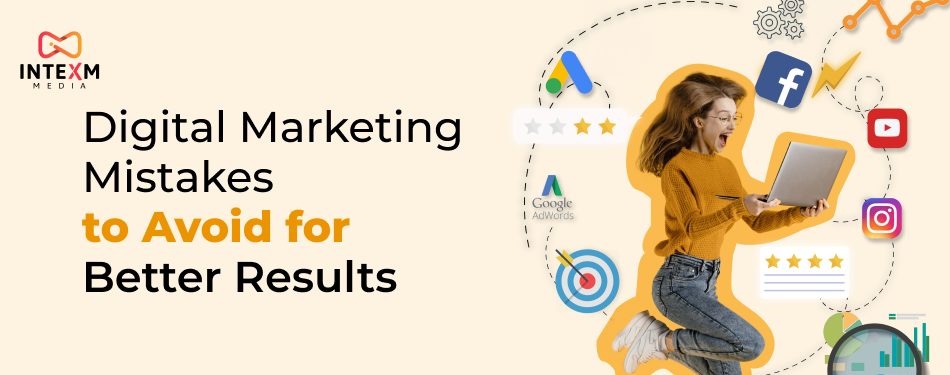
- 17 Mar, 2025by Mark
- Technology
- Digital Marketing, Marketing, Marketing Strategy, Advice, Target Audience,
5 Common Errors in Digital Marketing That Are Destroying Your Company
5 Common Errors in Digital Marketing That Are Destroying Your Company
Businesses may interact with customers and encourage growth with the help of digital marketing. When done right, it enables optimal efforts that save time and maximise outcomes. By comprehending and resolving typical issues, companies might accomplish remarkable results. The following are some common marketing hinders to be aware of.
5 Marketing Errors Your Company Should Steer Clear of
1. Not Having a Clear Marketing Strategy
The worst error a company can make is not having a defined marketing plan. Without a strategy, you risk losing time and money and your message and approach becoming unclear and inconsistent. Maintaining focus on your marketing objectives is made easier with a well-defined and solid approach.
Advice: Prioritise your business objectives and make sure that every marketing strategy you choose advances them. Consider who your ideal clients are and how to effectively connect with them. Feeling a bit overburdened? You could be in need of a local digital marketing agency. They are well-versed in the local market and will develop a plan that works for your company. Their experience will also help you save time, reduce stress, and get tangible results from your efforts.
2. Not Knowing Who Your Target Audience Is
In marketing, striving to please everyone is one of the worst blunders. By attempting to contact too many individuals, many of whom might not be interested in your services, you run the danger of wasting time and money. A disorganised strategy could not reach the people who actually need your goods or services.
Advice: Given the importance of understanding your customers, you ought to try to develop a thorough client profile. And to get better outcomes, you need to know their online patterns, pressure spots, habits, and demographics. Tools like surveys, Google Analytics, and consumer feedback are useful for this, and they are essential for organising your course of action. To target the exact demographic you desire, use ad networks like Google Ads, LinkedIn Ads, and Meta Ads. It may be easier to create messages that connect and eventually result in calls, enquiries, reservations, and income if you have a clear notion of your ideal client or customer.
3. Underestimating the Power of Social Media
In the present day, social media is a vital tool for businesses looking to engage with their target audience. Your target demographic uses these social media sites anyhow, so if you're not including them into your social media strategy, you're seriously losing out. Utilising social media is essential to boost conversions, build relationships, and improve brand awareness because over 5.17 billion people use it worldwide.
Advice: Clearly define the goal of social media for your company before you start using it. Are you using it to increase brand recognition and give people looking for your business useful information? Or is aggressively attracting and converting new consumers your aim? You may create a targeted plan that supports your goals and optimises your effect if you have a defined direction.
4. Putting Relationships Before Sales
Consumers like companies that create actual connections, show sincerity, and offer tangible benefits. Using aggressive sales techniques might turn off potential customers and reduce their likelihood of interacting. Strictly concentrating on short-term sales risks losing out on the long-term advantages of loyalty and trust, which both promote repeat business and strong brand advocacy. First, cultivate relationships; then, make sales.
Advice: Have meaningful interactions, reply to consumer questions right away, and provide informative information via social media and email. Create a community around your business rather than just advertising it.
One effective digital tactic to think about is email marketing. It's an economical and customised method of disseminating pertinent information, maintaining audience interest, and cultivating enduring client connections.
5. Neglecting Metrics and Data
Without measuring outcomes, marketing is like driving blind; you're not sure where you're headed. Businesses frequently make the error of depending on assumptions rather than data. It is impossible to determine what is and is not working and where to optimize your plan for better outcomes without examining crucial metrics. Stronger business growth and more intelligent marketing are the results of data-driven decisions.
Advice: Track the effectiveness of your marketing campaigns with tools like Google Analytics, social media analytics, and email campaign reports. Web traffic statistics, rates of conversion, and levels of engagement are important metrics to pay attention to since they will provide you with the information you need to make informed decisions. You can increase ROI, improve strategy, and make sure your marketing activities provide quantifiable, actual outcomes by using a data-driven approach.
Conclusion
To sum up, digital marketing is a strong instrument—but only if applied properly. Avoiding these five typical blunders can make the difference between ineffective attempts and actual business expansion. Maximising success requires a well-defined plan, an awareness of your target market, the use of social media, putting connections before sales, and data-driven decision-making. Your company may increase brand recognition, forge closer bonds with customers, and succeed over the long haul in the fiercely competitive digital market by avoiding these traps. All set to advance in level? Today, begin honing your marketing strategy!
...